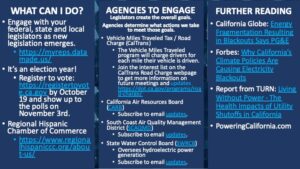We invite in our Annual Energy Economics & California Policy Forum.
The Forum is intended to engage and address the top concerns for the business community in California’s energy roadmap.
Since businesses are dependent on reliable and affordable energy for the continuity of their operations.
This contributes to the transportation challenges in California and is an issue for meeting the climate goals.
#EnergyEconomics
Keynote Speaker:
We look forward to seeing you at our Annual Energy Economics & California Policy Forum
| California Business Roundtable Responds to Introduction of SB 260 (Wiener)
|
California Business Roundtable issued the following statement today in response to the introduction of SB 260 (Wiener), the so-called Climate Corporate Accountability Act:“No other state is following our ‘lead’ on these types of climate change mandates. SB 260 sends another message to the business community that California is the highest-cost state to do business. Businesses continue to lead on climate change, investing billions to reduce our carbon footprint, but we can’t lead in ways that don’t allow others to follow. SB 260 tries to place the blame on companies for not adopting climate-reduction strategies, but the state remains the main barrier to allowing large companies to reduce their employees’ commute times and carbon footprint. Large-scale telecommuting can be one of the most impactful and immediate ways the business community can reduce its carbon emissions, but state legislators and the governor refuse to modernize state law that would allow more employers to offer this option to their workforces. If Senator Wiener and his colleagues are serious about actually fixing the problem, they should immediately begin working on updating California labor laws and allow more businesses to take advantages of the many benefits of telecommuting.“While we strongly oppose the bill, SB 260 would, ironically, give a true accounting of the significant environmental impact the state’s reliance on a single-source energy solution will have on global climate emissions.
“For years, we have raised concerns about the supply chain supporting the state’s aggressive push toward zero-emission vehicles (ZEVs), and yet the governor and the legislators backing this bill are still pushing the rapid investment in this technology. SB 260 requires publicly and privately held companies to disclose their carbon emissions, including non-core functions like supply chains. For ‘green’ companies that rely on lithium-ion batteries, including ones that power ZEVs and solar battery storage, they will be required to report on where and how those batteries are produced and quantify GHG emissions in their supply chain. This will include reporting on the factories in China that produce 75 percent of the world’s battery cells, 100 percent of graphite, 57 percent of lithium, and 86 percent of anode processing. In addition, a vast majority of the Cobalt needed to produce ZEV battery cells comes from the Democratic Republic of the Congo, with little or no environmental regulations and a laundry list of human rights violations. Requiring so-called ‘green’ companies to quantify the impact their mining and manufacturing operations overseas have on global carbon emissions will uncover a decades-old dirty little secret and may help promote better-informed decision-making here at home. The governor wants to invest $1.5 billion on this technology, choosing winners and losers rather than allowing diversified investments in clean alternatives like hydrogen.” |


